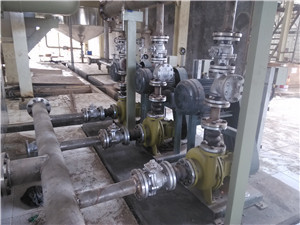A soybean oil mill is a facility or a set of equipment designed to extract oil from soybeans through various processes. The oil mill typically involves several stages, such as cleaning, crushing, cooking, pressing, and refining the soybeans to produce high-quality oil. Soybean oil is widely used for cooking, in the food industry, and in various industrial applications. A soybean oil mill can range from small-scale operations serving local markets to large industrial plants processing thousands of tons of soybeans per day for commercial distribution.
Soybean oil mills can be designed to work with different levels of automation, depending on the size and scope of production. For small or medium-scale businesses, a mini or small-scale soybean oil mill can be set up, whereas large industrial mills cater to mass production.
 Characteristics of a Soybean Oil Mill
Characteristics of a Soybean Oil Mill1. Multi-Step Process:
- Soybean oil production involves several stages, including cleaning, dehulling, crushing, cooking, pressing, filtration, and optional refining. Each step contributes to maximizing oil yield and improving oil quality.
2. High Oil Yield:
- The efficiency of modern soybean oil mills ensures a high extraction rate, usually yielding 18-20% oil from the soybeans. This makes the production process cost-effective and profitable.
3. Versatility:
- While primarily designed for soybean oil extraction, many soybean oil mills can process other oilseeds, such as peanuts, sunflower seeds, rapeseeds, and more.
4. Customizable Output:
- Soybean oil mills come in various sizes and capacities, ranging from small mills that process a few tons of soybeans per day to large industrial mills capable of handling hundreds of tons daily.
5. Energy Efficiency:
- Modern soybean oil mills are designed to consume less energy while maximizing output, making the process more sustainable and reducing operational costs.
6. Quality Control:
- Advanced soybean oil mills are equipped with quality control systems to monitor oil quality, ensuring that the final product meets food safety standards and is free from impurities.

Advantages of a Soybean Oil Mill
1. High Oil Yield:
- Efficient oil extraction techniques, particularly in modern soybean oil mills, ensure that a high percentage of oil is recovered from the soybeans, reducing waste and increasing profitability.
2. Cost-Effective Production:
- Setting up a soybean oil mill, especially small to medium-scale mills, offers a low-cost entry into the oil production industry. The operating costs are lower compared to other types of oil processing facilities.
3. Versatile Applications:
- Soybean oil mills can process not only soybeans but also other oilseeds. This versatility allows businesses to diversify their product offerings.
4. Automation Options:
- Many soybean oil mills offer automation features that reduce the need for manual labor, improve production efficiency, and minimize operational errors.
5. Improved Oil Quality:
- By refining crude oil extracted from the soybeans, a soybean oil mill can produce high-quality, clear, and purified oil that is free from impurities and has a long shelf life.
6. Environmentally Friendly:
- The by-products of the soybean oil production process, such as soybean meal, are used as animal feed, making the process more sustainable and reducing waste.
7. Scalability:
- Soybean oil mills are scalable, allowing producers to start small and gradually increase their capacity as their business grows. This flexibility makes it easier to adapt to market demands.

Application Scope of a Soybean Oil Mill
1. Cooking and Edible Oil Industry:
- Soybean oil is one of the most commonly used vegetable oils for cooking and food processing. A soybean oil mill produces refined oil that is used for frying, baking, and as an ingredient in various processed foods like margarine, salad dressings, and snacks.
2. Animal Feed Production:
- The by-products of soybean oil production, primarily soybean meal, are used as high-protein animal feed for livestock, poultry, and fish. This makes soybean oil mills an important part of the feed industry.
3. Industrial Applications:
- Soybean oil is also used in various industrial applications, including the production of biodiesel, lubricants, paints, resins, and plastics. The oil’s chemical properties make it a valuable component in these products.
4. Cosmetic and Pharmaceutical Industries:
- Refined soybean oil is used in the cosmetic and pharmaceutical industries for the production of skin creams, lotions, and other personal care products. The oil's moisturizing properties make it a preferred ingredient in many cosmetic formulations.
5. Small and Medium Enterprises (SMEs):
- Small soybean oil mills are ideal for entrepreneurs or cooperatives in rural areas or developing countries. These mills allow local farmers and small business owners to process soybeans into oil for local markets or small-scale commercial production.
6. Agricultural Cooperatives:
- Many farmer cooperatives invest in soybean oil mills to process their soybean crops, adding value and providing a sustainable source of income for the community. This promotes local economic development.
A soybean oil mill is a versatile and essential facility for the extraction and production of soybean oil, offering numerous benefits for food, industrial, and animal feed applications. With the ability to scale production, provide cost-effective oil extraction, and diversify into other oilseeds, a soybean oil mill is a profitable venture for businesses, farmers, and cooperatives alike. Its broad application scope and advantages, such as high oil yield and the utilization of by-products, make it a vital part of the global oilseed processing industry.



.jpg?x-oss-process=image/resize,m_fill,h_300,w_300/format,webp)










.png)


